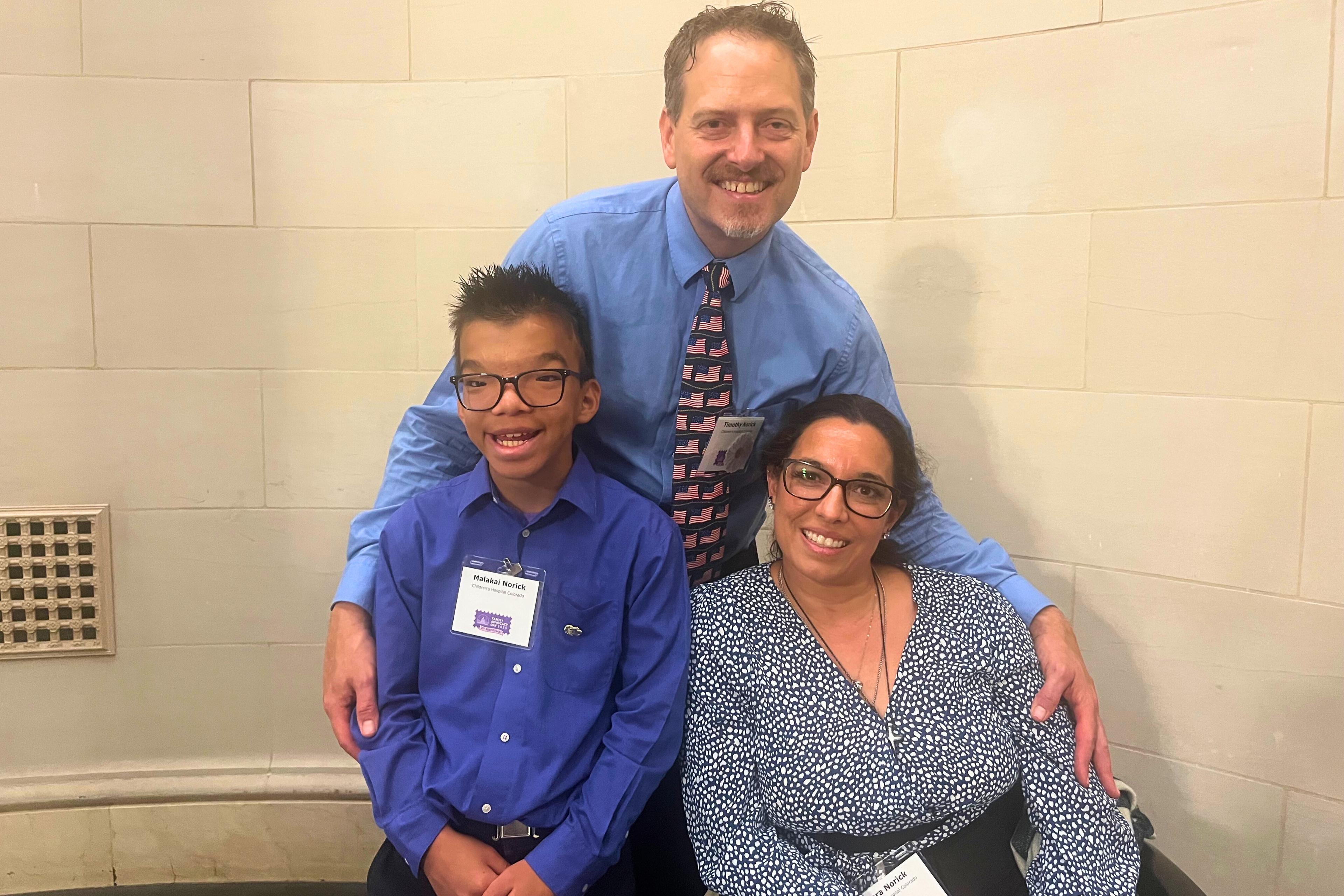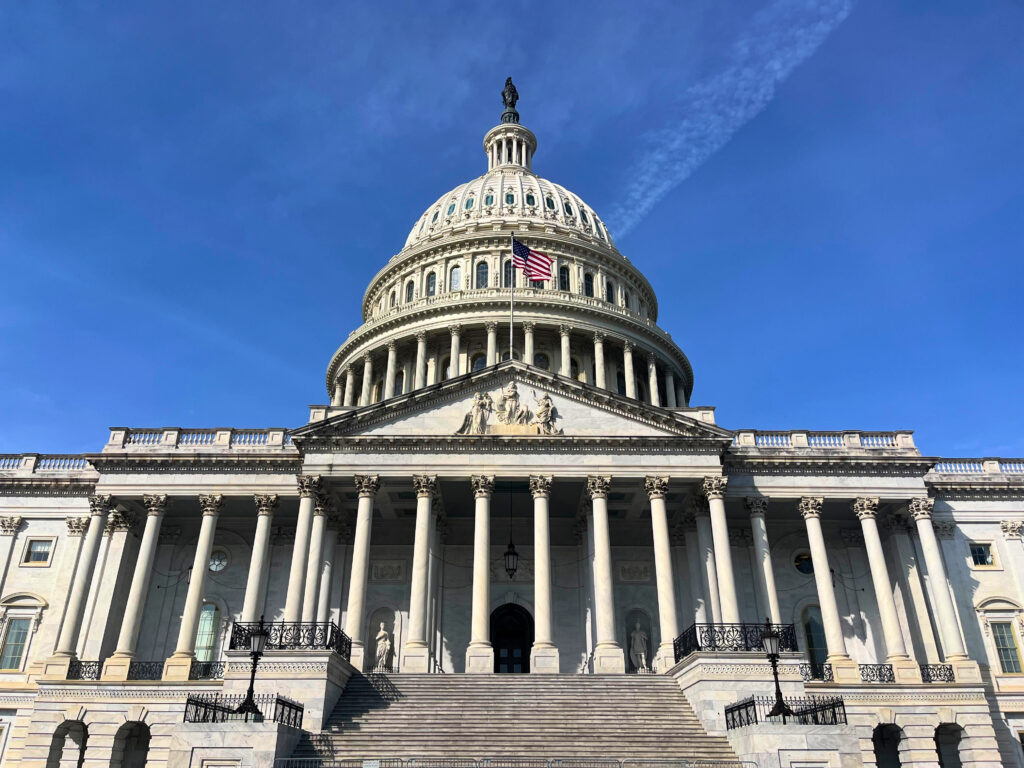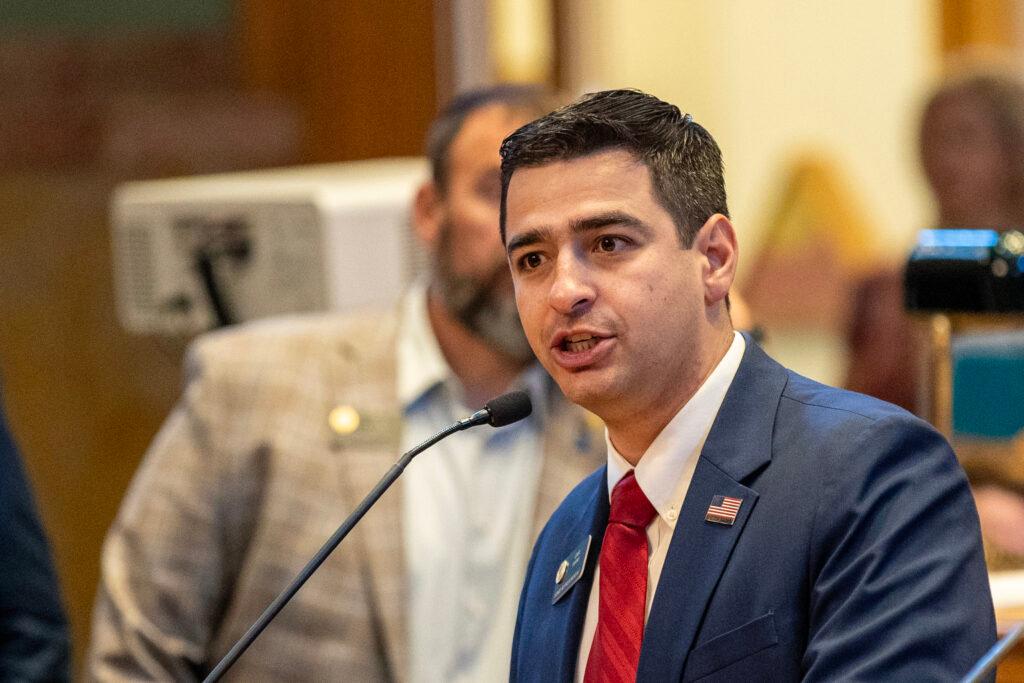
Josh Shipley of Montrose and Malakai Norick of Littleton don’t have much in common.
Shipley is the owner of Alternative Power Enterprises, a rural solar firm, with offices in Ridgeway and Montrose on the Western Slope.
Malakai is a rising 6th grader who’s been diagnosed with Opitz G/BBB syndrome, a rare genetic disorder.
However, both of them were in the U.S. Capitol last week, to meet with Republican and Democratic lawmakers about their concerns with the GOP’s One Big Beautiful Bill.
Every year, hundreds of thousands of constituents — average, everyday people — write or call their local lawmaker to advocate for changes or express their opinions about bills Congress considers. But some go a step further; they travel to Washington to meet with lawmakers in an effort to put face to some of the issues congress members will be deciding.
Republicans, who hold a slim majority in both chambers, are using a process called reconciliation to pass this bill without needing Democratic votes. Still, Democrats are also trying to put pressure on GOP members to oppose some provisions of the bill and possibly kill this iteration of the bill.
This is the experience of two Coloradans who recently made the trek.
The fate of a business could hinge on clean energy tax credits
On a muggy Thursday morning a couple of blocks away from the U.S. Capitol, Josh Shipley of Montrose talked to me about the Investment Tax Credit (ITC). It’s the issue that made him want to travel 2,000 miles east with the grassroots group called United Today, Stronger Tomorrow, to the U.S. Capitol to meet with Colorado lawmakers or their staff.
It’s a 30 percent credit for residential homes and commercial businesses that install solar. In 2020, during Trump’s first term, he extended the credit for two years. In 2022, former President Joe Biden extended it again as part of the Inflation Reduction Act, this time to 2032, when it was set to gradually decrease, what’s known as a step down, for a few years before being eliminated in 2035.
Now, Republicans, especially the hard-right wing of the party, want the credit gone immediately.
“We're talking hundreds of thousands of lost jobs. It's huge. That's across the country,” Shipley explained. “I mean, there's a decent chance that it bankrupts my company.”
Shipley worked for Alternative Power Enterprises for 10 years before buying the company in 2020. His business plan took into account the ITC because it was and still is part of the tax code.
“We understand it's not going to stay forever, but the 30 percent leaving at the end of the year for residential systems is a pretty hard quit for businesses to be able to withstand,” he said.

That was his message to lawmakers: an abrupt change like this can have real devastating impacts for the private sector, especially where there’s already a lot of uncertainty right now with the economy, with tariffs.
Add in a tax cliff and consumers may hold off on a lot of discretionary purchases, including going solar.
The tax changes, Shipley said, will also impact commercial projects.
“These two go hand in hand. Without the residential credit, a lot of these smaller companies that are doing large scale systems can't afford cashflow in between these large projects. They can't afford to keep their workforce in between these large projects,” he explained.
Shipley worries that skilled workers are going to leave the industry altogether. “We were at 15 (employees) before COVID, now we're down to eight, and we were slowly building those back. It just takes a lot of time to educate.”
A 12-year-old boy talks Medicaid
On Thursday, Malakai Norick, a patient ambassador for Children’s Hospital Colorado, sought to educate through seven meetings with Colorado lawmakers or their staff.
Long after many lawmakers had left the building, the 12-year-old was still energetic and excited by how his meetings had gone.
“It was really fun. I was happy to tell my story to them,” he said.
He had his speech memorized and recited it to me. He was born in China with Opitz G/BBB syndrome, which causes potentially severe abnormalities along the midline of the body. Malakai was adopted by Tim and Kara Norick when he was 3 years old and brought to Children’s Hospital Colorado where he’s had more than 20 surgeries.
His speech was peppered with fun details that show his familiarity with the facility, like how he likes when the hospital brings in dogs for the kids to pet, how his mom likes the coffee there and his dad likes the massage chair.
Malakai said he was nervous about the idea of coming to talk with lawmakers, but also wanted “to help children like me get the stuff that they need and the support, so they can feel better.”
The Norick family, which includes five siblings who also traveled to DC, are concerned about changes to Medicaid that Republicans are considering.

Kara Norick is a health coach and stay-at-home mom. Tim Norick an engineer for Lockheed Martin. They have health insurance, but it doesn’t cover all of Malakai’s treatments and medicines.
“I think people don't realize that. They think, ‘oh, you have private insurance, you have a good job… you don't have any need for Medicaid.’ But there are things that it covers and supplements to fill in some of those holes or gaps that I think people aren't really aware of outside,” said Tim Norick.
What really concerns them is a plan to have states verify Medicaid status every six months instead of annually. The paperwork for that can be tough. Last year, the Noricks thought they had re-qualified for Medicaid, only to get notified that they no longer had Medicaid. It meant Malakai missed some injections while Kara got all the paperwork together again.
“Even a short hiccup due to paperwork or whatever that caused him to not have those supports, the medication and such, I think that's just one thing that is not well-known of the impact that it can have even in the shortest amount of time,” said Kara Norick.
Kara likened coming to talk to lawmakers to shepherds managing their flock.
“If the shepherd doesn't smell like the sheep, the sheep don't trust, the sheep don't know his voice, they won't come and they'll be picked off,” she explained. “Malakai was there. They cared that he was there. They cared about the impact on Malakai. And we're walking away and they smell a little bit more like the sheep, which I think is really great because it's that human heart point that really is the magic sauce.”
Does putting a face to a problem make a difference?
The reconciliation bill is currently being negotiated in the Senate, which is expected to make changes to it, and then send it back to the House for another vote.
For the Coloradans who lobbied lawmakers in person, it means there is still hope for changes.
The Norick family left their meetings with Colorado lawmakers feeling good about the effort they made.
Both Tim and Kara felt like lawmakers took to heart Malakai’s story.
“They were all very receptive. I mean, they heard his story… Some got even emotional with hearing his story. So, I mean, I think it did make an impact. And putting that face to it, I think is what's really important,” Kara Norick said.
Some Republican lawmakers have been very vocal about opposing Medicaid cuts and changes to policy. But of Colorado’s Republicans, only Rep. Jeff Hurd signed onto a letter to “preserve” Medicaid. He and every other Colorado Republican voted for the bill with the shorter, six-month Medicaid reapplication requirement.
Meanwhile, Shipley left Washington resigned.
He’s still hoping that Senate Republicans provide some sort of slower off-ramp for the ITC tax credit that goes beyond the end of this year.
Of Colorado’s Republicans, both Hurd and Rep. Gabe Evans signed onto letters asking for a longer exit for the clean energy tax credits in the bill. Evans and 11 other Republicans most recently signed onto a letter sent to the Senate asking them to improve the clean energy tax credit section that they again all voted for.

Shipley said the lawmakers he met with understood why an off-ramp is helpful, but the Republicans he met with were also blunt.
“It’s a large bill and there’s a lot of other things that people want to vote for in it. And we’ve heard from one member of Congress and a couple of staffers that that wouldn’t kill their vote,” Shipley said.









